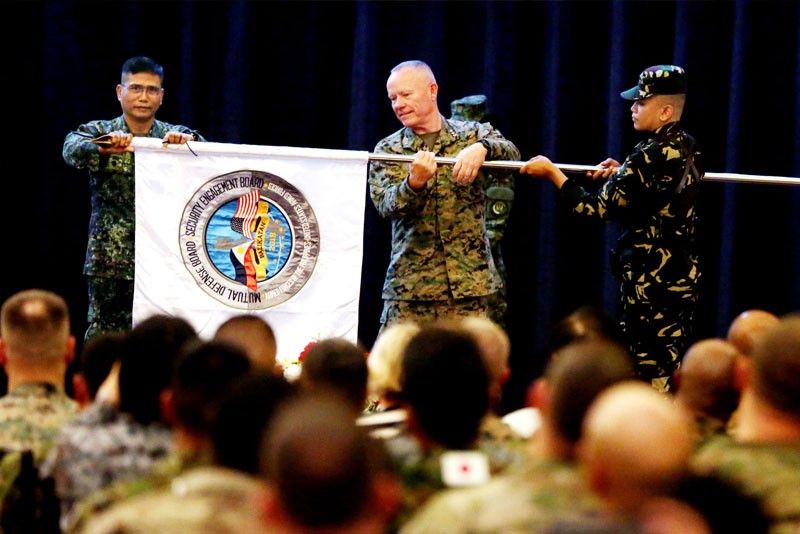Balikatan opens amid concern over China missiles

MANILA, Philippines — China’s deployment of missiles in the West Philippine Sea has nothing to do with this year’s joint military exercises between the United States and the Philippines called Balikatan (shoulder-to-shoulder), officials from both countries said yesterday.
“This exercise was scheduled whether those missiles were there or not, and again this is a region of change. There are constant things developing in the region but the exercise has been planned,” Lt. Gen. Lawrence Nicholson, commander of the US 3rd Marine Expeditionary Force based in Japan, said.
Nicholson is this year’s Balikatan exercise director for the US.
China’s deployment of surface-to-surface cruise missiles and surface-to-air missiles in three of seven manmade islands in the Spratlys archipelago has again stoked tensions in the region. The islands reclaimed by China are within the Philippines’ exclusive economic zone.
Nicholson’s assurance was made in a press briefing after the opening of the joint drill.
Defense Secretary Delfin Lorenzana and US Ambassador Sung Kim attended the event.
In two weeks, Nicholson said Filipino and US officials would discuss the next Balikatan.
Lt. Gen. Emmanuel Salamat, Northern Luzon Command (Nolcom) chief and Balikatan exercise director for the Philippines, stressed that the conduct of this year’s joint military drill would be within the scope of activities planned months ago.
“We intend to focus our activities on the objective that we have set. We have to enhance our cooperation and military responses, intended to provide training opportunities for both armed forces,” he said.
Some 5,000 US servicemen and 3,000 Filipino soldiers from the three major services are participating in the joint war games, including amphibious landing exercises on the beaches of Zambales, live-fire drills in Crow Valley in Tarlac and close-quarter battle training at Fort Magsaysay in Nueva Ecija.
The amphibious assault, originally under the Philippine Amphibious Landing Exercise or Phiblex, was a revival of last year’s activity scrapped by President Duterte.
In his decision, Duterte argued the US military was benefiting more from the drill.
The development prompted the US and the Philippines to downscale the military exercises – the biggest in the region – to Humanitarian Assistance and Disaster Response (HADR) joint drills.
‘Nothing has changed’
Nicholson maintained that since the launch of the Balikatan exercises years ago under the Philippines-US Mutual Defense Treaty (MDT), nothing has changed in the overall concept of the program.
“Its size and scope, the opening ceremony is just great as it normally is, the band was playing, the sun was shining and we have four nations here ready to train. So I don’t see anything a whole lot different,” he said.
Australia and Japan are the two other countries involved in Balikatan.
“Our nations expect us to be ready when they need us the most. So whether that threat is manmade or natural, we must be ready. That is the great essence of Balikatan,” the US military official said.
Capt. Brad White, Australia’s defense attaché in the Philippines, said some 70 Australian troops are joining the anti-terrorism training with Filipino and US troops at Fort Magsaysay.
He said the presence of Australian troops is in line with his country’s full support for the Philippines’ anti-terror efforts. The Australian troops, many of whom had been assigned in Iraq, are training Filipino soldiers at various camps.
Salamat said Filipino soldiers would share with their foreign allies some lessons learned from their experience defeating Maute and Abu Sayyaf terrorists in Marawi City last year.
“We have military operation on urban terrain. We have set up mock facilities to be able to design the training activities in a scenario that will appreciate the kind of military urban environment that both forces can benefit from the Marawi experience,” Salamat said.
Meanwhile, Salamat reversed an earlier pronouncement limiting media coverage to the opening and closing of the military exercises.
“We don’t have official declaration that we do not want (media) to cover the exercises. You can cover all the exercises, including amphibious exercises,” Salamat said.
But the media ban on the Crow Valley live-fire drill stays for security reasons, he said.
- Latest
- Trending



























